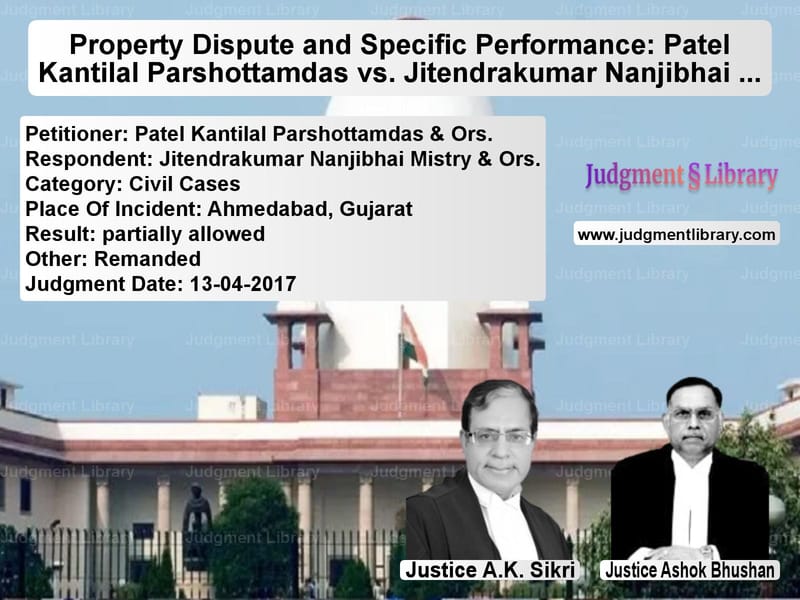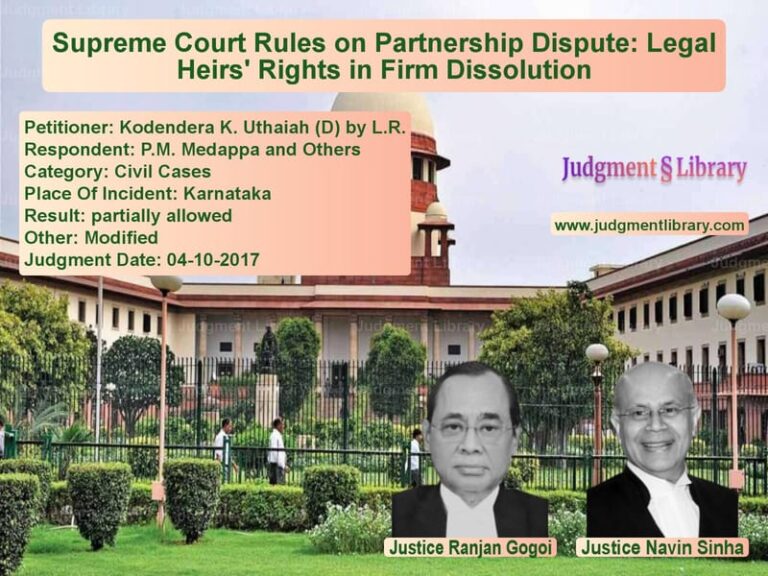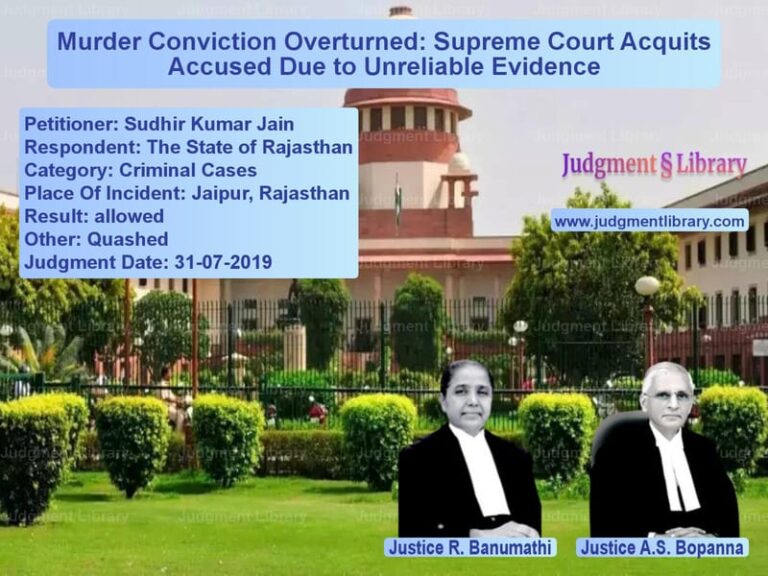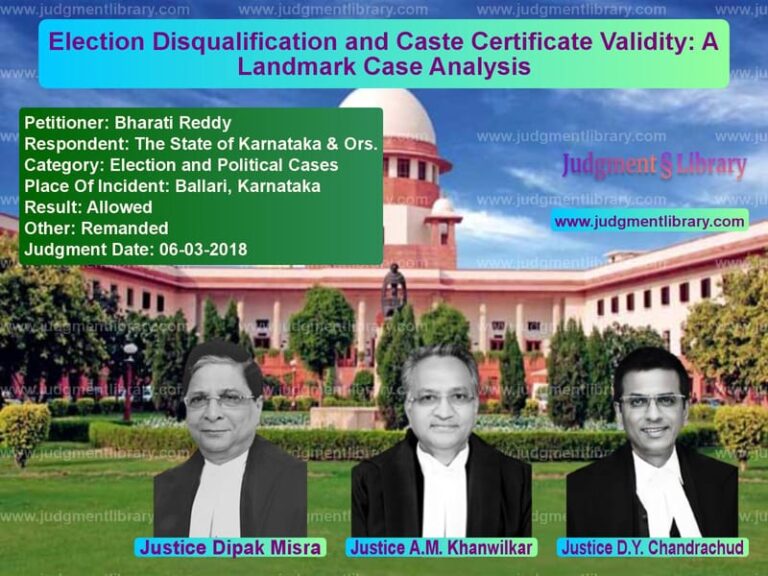Property Dispute and Specific Performance: Patel Kantilal Parshottamdas vs. Jitendrakumar Nanjibhai Mistry
The case of Patel Kantilal Parshottamdas vs. Jitendrakumar Nanjibhai Mistry revolves around a long-standing dispute concerning a property transaction, breach of contract, and the enforcement of specific performance. The Supreme Court had to decide whether the sale agreement between the parties was valid, whether the purchaser fulfilled his obligations, and whether the relief of possession could be granted.
This case highlights critical legal principles surrounding property transactions, the doctrine of specific performance, and how courts determine the validity of contractual agreements.
Background of the Case
The dispute pertains to a property situated outside Shanpur Darwaza, Ahmedabad, measuring 828 square yards. The original owner, Jeevandas, leased the property to Kanti (Patel Kantilal Parshottamdas) for 99 years on April 16, 1959, with an option to purchase.
On July 15, 1974, Kanti entered into an Agreement to Sell with Jitendrakumar Nanjibhai Mistry (Jitender) for Rs. 1,85,001/-. Jitender paid an earnest amount of Rs. 25,000 initially and later Rs. 20,000 more. The sale deed was to be executed within five months, later extended by another five months. However, the sale deed was never executed, leading to a legal dispute.
Kanti eventually issued a notice on May 6, 1981, canceling the Agreement to Sell, alleging that Jitender had failed to fulfill his contractual obligations. Jitender contested this claim, arguing that the execution period had been extended further by mutual agreement.
Legal Dispute and Court Proceedings
- Kanti filed two suits: one seeking cancellation of the Agreement to Sell and another for possession and mesne profits.
- Jitender, in response, filed a suit for specific performance, demanding execution of the sale deed.
- All suits were consolidated for trial.
Trial Court’s Judgment
The trial court ruled in favor of Kanti, dismissing Jitender’s suit for specific performance, holding:
- The suit was barred by limitation.
- Jitender had failed to prove his readiness and willingness to perform the contract.
- Jitender never appeared as a witness to support his claims.
The court also decreed Kanti’s suit, ordering the cancellation of the agreement and granting possession.
High Court’s Decision
Jitender appealed, and during the appeal process, both Kanti and Jitender passed away, with their legal heirs continuing the litigation.
The High Court upheld the dismissal of Jitender’s suit for specific performance, agreeing that he had not fulfilled his obligations. However, the High Court reversed the trial court’s decree in Kanti’s suit, remanding the case for reconsideration.
The High Court held that:
- Kanti was only a lessee with an option to purchase but had not exercised it.
- The Agreement to Sell was a contingent contract, dependent on Kanti acquiring ownership.
- The suit needed fresh examination under Section 31 of the Specific Relief Act, 1963.
Supreme Court’s Judgment
The Supreme Court set aside the High Court’s remand order, ruling that:
- The High Court erred in setting up a new case regarding the nature of the agreement.
- The issue of ownership was never pleaded by Kanti and was wrongly introduced by the High Court.
- Kanti’s claim for possession should be reconsidered by the High Court, as the original suit’s cancellation relief was already achieved by the dismissal of Jitender’s suit.
The Court observed:
“The High Court could not, of its own, set up a new case which was not pleaded by any of the parties. The liberty to amend the pleadings, allowing the appellant to introduce a new case, was erroneous in law.”
Key Legal Takeaways
- Specific performance requires readiness and willingness: A party seeking specific performance must demonstrate their willingness to comply with contractual obligations.
- Limitation periods are strictly enforced: A delayed suit for specific performance can be dismissed for being time-barred.
- Courts cannot introduce new legal arguments: Courts must decide cases based on the issues raised by the parties and not formulate new theories.
- Possession claims must be properly examined: The issue of possession was sent back to the High Court for further consideration.
Implications of the Judgment
The ruling reinforces that courts must adjudicate disputes based on the arguments and evidence presented, without adding their interpretations. It also emphasizes the necessity of fulfilling contractual obligations to seek specific performance.
Conclusion
The Supreme Court’s decision in this case underscores the importance of clear contractual obligations and strict adherence to legal procedures. The ruling protects property owners from unwarranted claims while ensuring that possession rights are fairly determined.
The case has been sent back to the High Court to determine whether possession should be granted to Kanti’s legal heirs, ensuring due process is followed.
Don’t miss out on the full details! Download the complete judgment in PDF format below and gain valuable insights instantly!
Download Judgment: Patel Kantilal Parsh vs Jitendrakumar Nanjib Supreme Court of India Judgment Dated 13-04-2017.pdf
Direct Downlaod Judgment: Direct downlaod this Judgment
See all petitions in Property Disputes
See all petitions in Specific Performance
See all petitions in Contract Disputes
See all petitions in Judgment by A.K. Sikri
See all petitions in Judgment by Ashok Bhushan
See all petitions in partially allowed
See all petitions in Remanded
See all petitions in supreme court of India judgments April 2017
See all petitions in 2017 judgments
See all posts in Civil Cases Category
See all allowed petitions in Civil Cases Category
See all Dismissed petitions in Civil Cases Category
See all partially allowed petitions in Civil Cases Category







